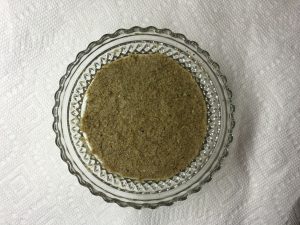 DIRECTIONS: To make PUDDING FOR POOCHESTM (alternatively known as POOCH PUDDINGTM and as other names) add approximately 1/4 to 1/3 cup of clean water for every two-ounces of product and stir thoroughly. On cold days you can use warm water and on hot days you can use chilled water. Freshly mixed product can be refrigerated for 3 or 4 days or stored in the freezer for one month. Since some started using less water to make (1) cookie, (2) brownie, (3) cake and/or (4) thicker pudding treats, this product has also become known as PUDDING 4 POOCHESTM and POOCHIE PUDDINGTM. Interestingly, this latter name came about since “i.e.” means “that is” so POOCHIE PUDDINGTM conveys the message “Pooch that is PuddingTM .” Yet, regardless of how much water you add or if you simply sprinkle the product on your current dog food as a seasoning, you can serve your mixture warm, at room temperature, chilled or frozen like ice cream to make a delicious, nutritious dog treat.
DIRECTIONS: To make PUDDING FOR POOCHESTM (alternatively known as POOCH PUDDINGTM and as other names) add approximately 1/4 to 1/3 cup of clean water for every two-ounces of product and stir thoroughly. On cold days you can use warm water and on hot days you can use chilled water. Freshly mixed product can be refrigerated for 3 or 4 days or stored in the freezer for one month. Since some started using less water to make (1) cookie, (2) brownie, (3) cake and/or (4) thicker pudding treats, this product has also become known as PUDDING 4 POOCHESTM and POOCHIE PUDDINGTM. Interestingly, this latter name came about since “i.e.” means “that is” so POOCHIE PUDDINGTM conveys the message “Pooch that is PuddingTM .” Yet, regardless of how much water you add or if you simply sprinkle the product on your current dog food as a seasoning, you can serve your mixture warm, at room temperature, chilled or frozen like ice cream to make a delicious, nutritious dog treat.